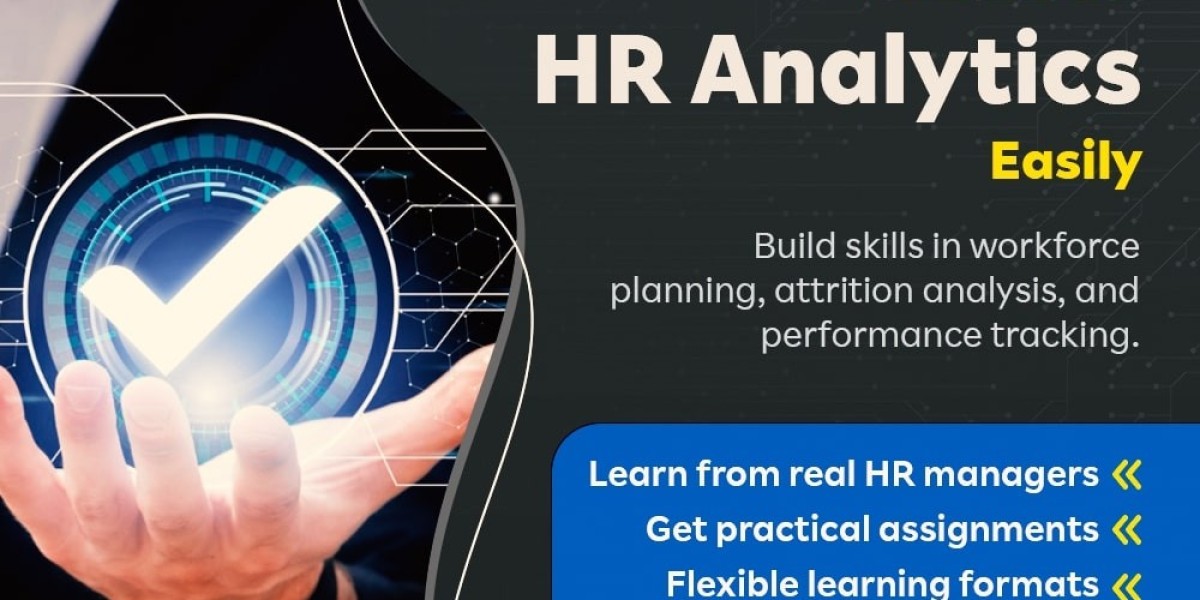Introduction
In today’s corporate world, human resources is no longer limited to just recruitment, payroll, or compliance. Organizations are increasingly relying on data driven insights to make informed HR decisions. This is where HR analytics has gained massive importance. For professionals in India, particularly in metropolitan cities, specialized training programs are becoming a stepping stone to better opportunities. Among these, the hr analytics training course in mumbai has emerged as one of the most popular options for HR aspirants and working professionals. The course is not just about learning HR processes but also about integrating data science and analytics into HR practices.
This blog explores the scope of HR analytics, its relevance, the benefits of enrolling in such a program, and why choosing an hr analytics training course in mumbai can give professionals an edge in their career growth.
What Is HR Analytics and Why Does It Matter Today?
HR analytics, also known as people analytics or workforce analytics, refers to the process of analyzing employee related data to improve decision making in HR functions. For instance, instead of making hiring decisions based only on intuition, HR professionals use data insights to predict the right candidate fit, reduce attrition, and measure employee productivity.
Specialized learning programs in this area are designed to provide participants with expertise in data collection, interpretation, and visualization techniques relevant to HR functions. Learners are introduced to tools such as Excel, SQL, Python, and visualization platforms like Power BI or Tableau, along with HR-specific systems that integrate analytics features. These programs also emphasize case studies and live projects, giving participants the ability to apply analytical methods to real-world workforce scenarios. The focus is not only on technical skills but also on developing the ability to translate complex data into meaningful strategies that improve organizational effectiveness.
An hr analytics training course in mumbai equips learners with the technical and analytical knowledge needed to carry out these functions effectively. With the growing digital transformation, companies prefer HR professionals who understand both human capital and data analytics.
Why Should Professionals Choose HR Analytics Training?
Enrolling in an hr analytics training course in mumbai allows professionals to develop skills that are highly in demand in the market. As organizations evolve, HR teams are expected to take a strategic role rather than just perform administrative tasks. This training empowers HR professionals to bridge the gap between HR functions and organizational strategy.
Building expertise in this domain opens up a variety of career opportunities, including roles such as HR analyst, people analytics specialist, workforce planning consultant, or HR business partner with a focus on data. With industries across IT, healthcare, finance, retail, and manufacturing adopting analytics-based HR strategies, professionals trained in this area enjoy strong demand, competitive salaries, and opportunities for career growth both in India and globally. Ultimately, developing these skills ensures a future-proof career aligned with the digital transformation of the workplace.
Key Benefits of Pursuing HR Analytics Training
One of the main advantages of joining an hr analytics training course in mumbai is that it enhances employability. Let’s explore some of the major benefits below.
Advantages:
Better decision-making using data-driven insights.
Higher demand in the job market with better salary prospects.
Ability to forecast employee behavior and reduce turnover.
Improved hiring strategies by identifying top talent through analytics.
Enhanced credibility as an HR professional with technical expertise.
Disadvantages:
The learning curve may be steep for non-technical HR professionals.
Some organizations may not have a fully developed analytics infrastructure yet.
Continuous learning is required as analytics tools and techniques evolve.
Initial course fees may be high depending on the institute.
Practical application requires both training and organizational support.
What Can You Learn in an HR Analytics Training Course?
A typical hr analytics training course in mumbai covers topics like HR metrics, employee performance analytics, recruitment analytics, predictive modeling, and data visualization. Learners are also introduced to popular analytics tools such as Excel, Python, R, Power BI, and Tableau.
Human resource management has undergone a significant transformation in recent years, shifting from traditional, process-driven tasks to data-driven strategies that help organizations make informed decisions about their workforce. One of the most impactful developments in this space is the use of analytics to optimize hiring, performance, retention, and employee engagement. By leveraging data, companies can identify trends, predict future workforce needs, and address potential challenges before they arise.
For example, analyzing patterns in employee turnover can help organizations design better retention strategies, while studying performance metrics can guide decisions on training and promotions. Professionals with knowledge in this field are highly sought after, as businesses increasingly recognize the value of making strategic HR decisions backed by real-time insights rather than assumptions.
This ensures that participants not only understand HR concepts but also know how to interpret and analyze large sets of employee data.
Frequently Asked Questions About HR Analytics Training
1. What career opportunities open up after completing the course?
Completing an hr analytics training course in mumbai opens roles like HR Analyst, Workforce Planner, Talent Analytics Specialist, and HR Data Scientist.
2. Is this course suitable only for HR professionals?
No, the course is ideal not just for HR professionals but also for data analysts, business analysts, and managers who want to integrate HR and data-driven decision-making.
3. Do companies really value HR analytics certifications?
Yes, employers consider an hr analytics training course in mumbai a valuable credential since it reflects both HR and technical expertise.
4. How long does it take to complete HR analytics training?
The duration may vary from a few weeks to a couple of months, depending on the institute and mode of training.
5. Will this course help in career growth for mid-level professionals?
Absolutely. An hr analytics training course in mumbai helps mid-level HR professionals transition into more strategic roles where they can influence organizational decisions.
Why Is Mumbai the Right Place for HR Analytics Training?
Mumbai, being the financial capital of India, offers immense opportunities for HR professionals. Institutes offering an hr analytics training course in mumbai are well-connected with industry experts and corporate houses, making the city a hub for career advancement. Learners also get access to networking opportunities, internships, and industry projects, which make their training even more impactful.
Conclusion
The role of HR has significantly evolved, and data-driven strategies are now at the core of people management. An hr analytics training course in mumbai helps professionals gain the right mix of HR expertise and analytical knowledge, making them future ready. Despite a few challenges, the benefits clearly outweigh the drawbacks, making it a wise investment for career growth. Whether you are a fresher or an experienced HR professional, training in HR analytics can transform your career path and make you an indispensable part of any organization.








